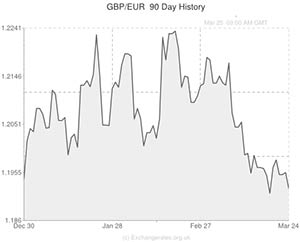
The Pound to Euro exchange rate (GBP/EUR) rallied by around half a cent yesterday, but still remains capped below psychological support at 1.2000. The highest level that Sterling reached yesterday was 1.1991.
The catalyst for the single currency’s decline yesterday was a concerted campaign of comments from policymakers at the European Central Bank.
The first, and possibly most significant, comments were made by Bundesbank President and ECB policymaker Jens Weidmann. The German Central Banker, who is known for his hawkishness, shocked markets by stating that the Bank could cut rates to curb the rise of the Euro. He also mentioned that the ECB is considering buying assets from banks to combat deflation:
“Of course any private or public asset that we might buy would have to meet certain quality standards”.
Traditionally, the Bundesbank is predisposed to oppose aggressive easing measures because of the potential to spur inflation. The horror of hyperinflation during the Weimar Republic lives on through the minds of modern-day German Central Bankers. This makes it all the more significant that Weidmann chose to strike such a dovish tone yesterday.
Another policymaker, Jozef Makuch, said that the Bank is preparing non-standard measures to help curb inflation and mentioned that quantitative easing is an effective weapon in the ECB’s arsenal:
“The reason why we are preparing additional non-standard measures [is] to avoid getting into a deflationary environment”.
Finish Central Banker and ECB policymaker Erkki Liikanen followed suit with a set of comments on the possibility of cutting the deposit rate into unchartered negative territory:
“Setting a negative deposit rate to guard against excessively low inflation is an option. The question of negative deposit rates, in my mind, isn’t any longer a controversial issue”.
And European Central Bank President Mario Draghi rounded off the day by stating that he is prepared to take further steps to fight deflation if the Eurozone §Consumer Price Index does not rise to 1.0% this year:
“If any downside risks…appear, we stand ready to take additional monetary policy measures that ensure our mandate is fulfilled”.
The unexpectedly dovish ECB remarks made Euro investors slightly jittery and this weighed on demand for the single currency. Despite the fact that earlier in the day UK CPI inflation fell to a new 4-year low of 1.7%, which could dissuade the Bank of England from hiking interest rates ahead of schedule.

Comments are closed.